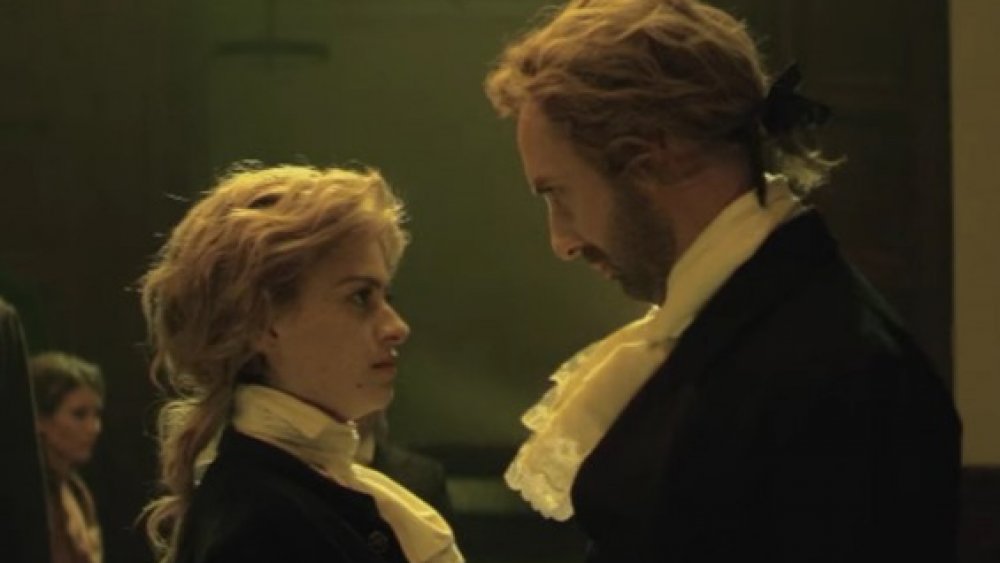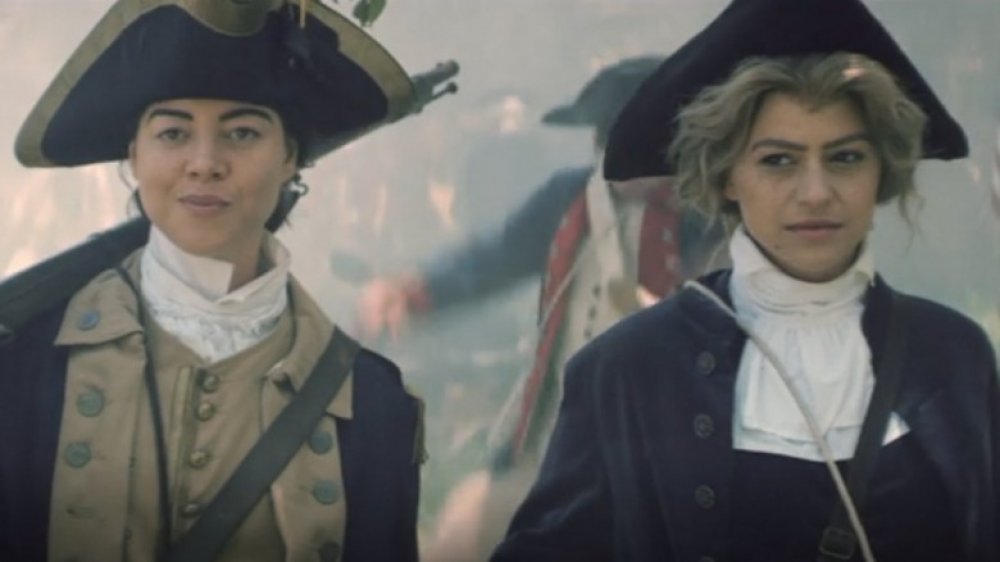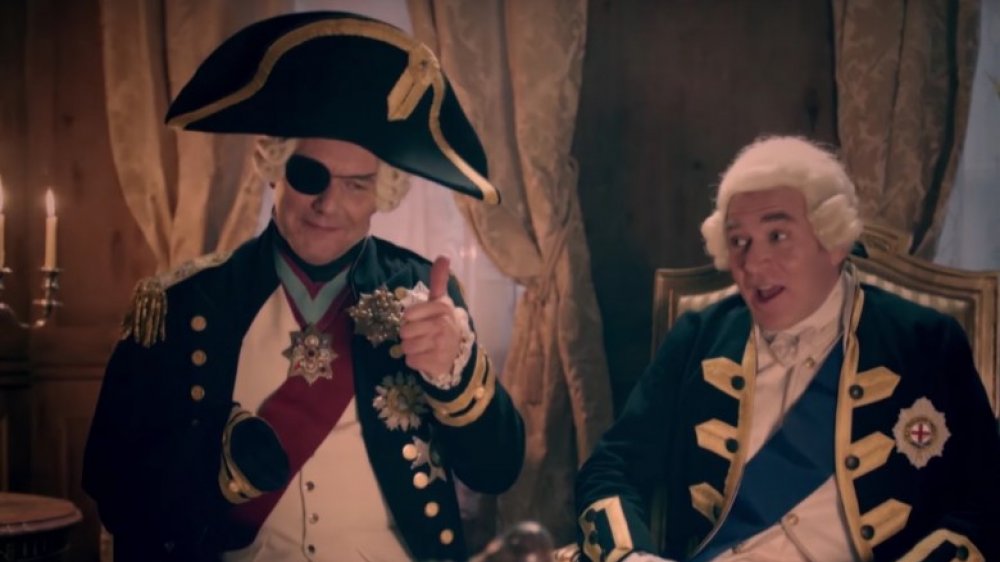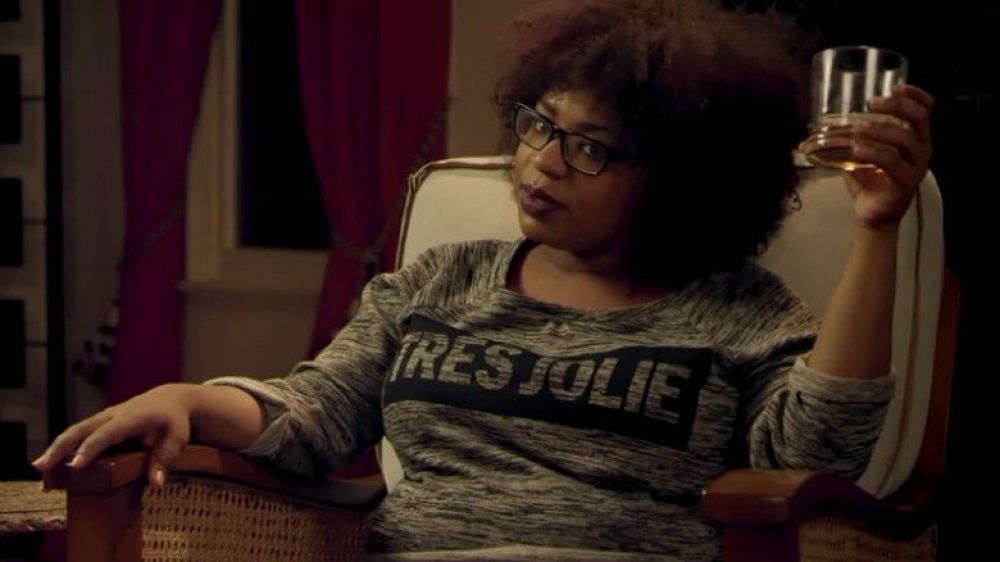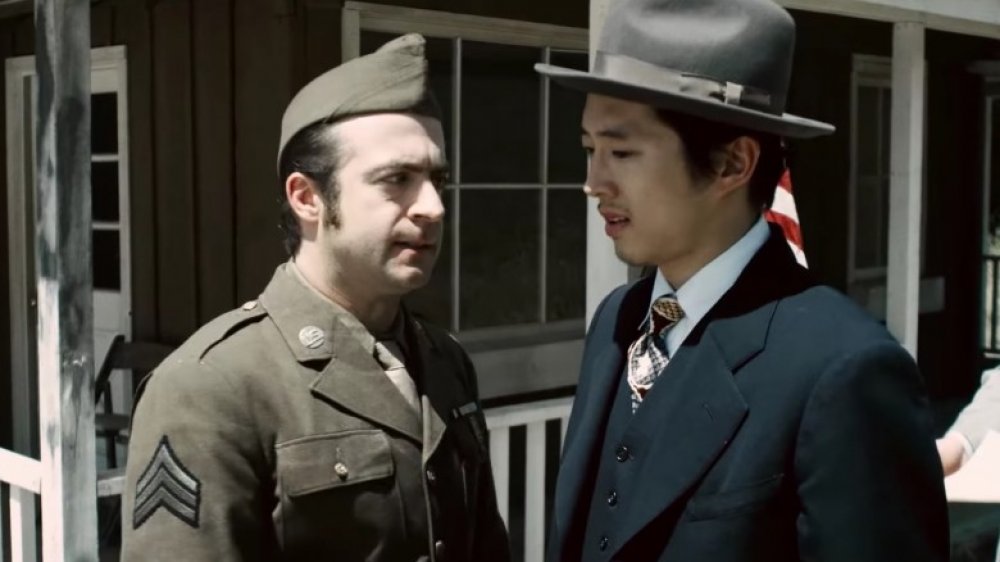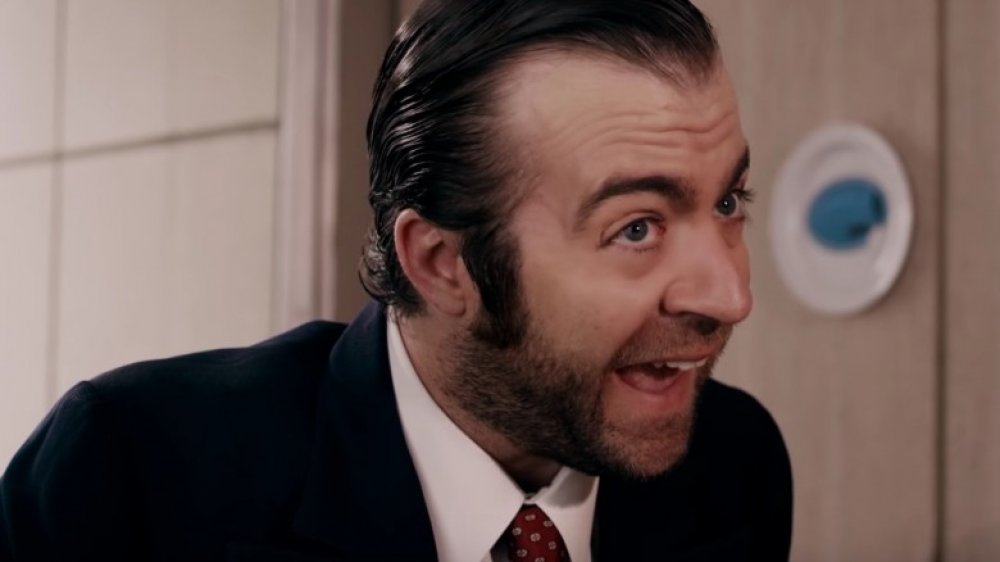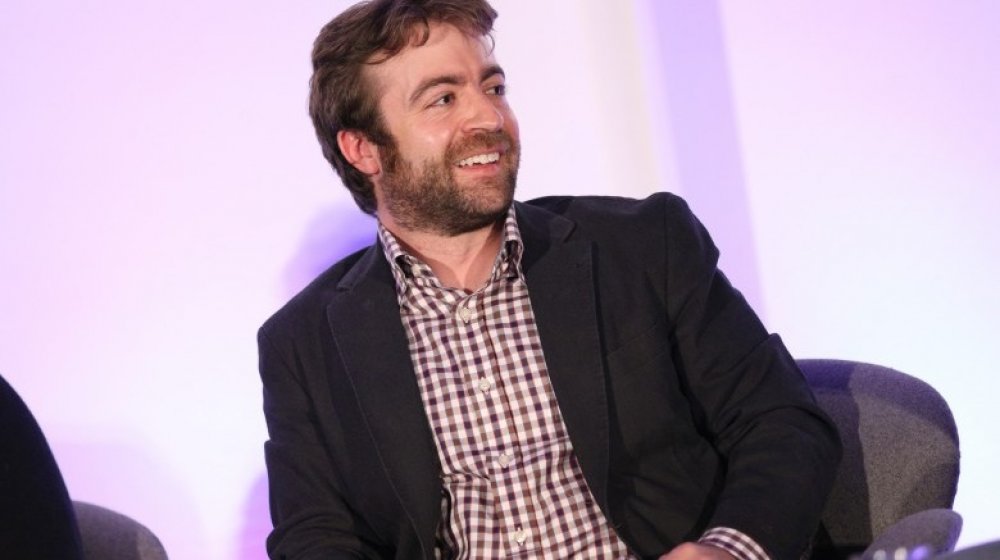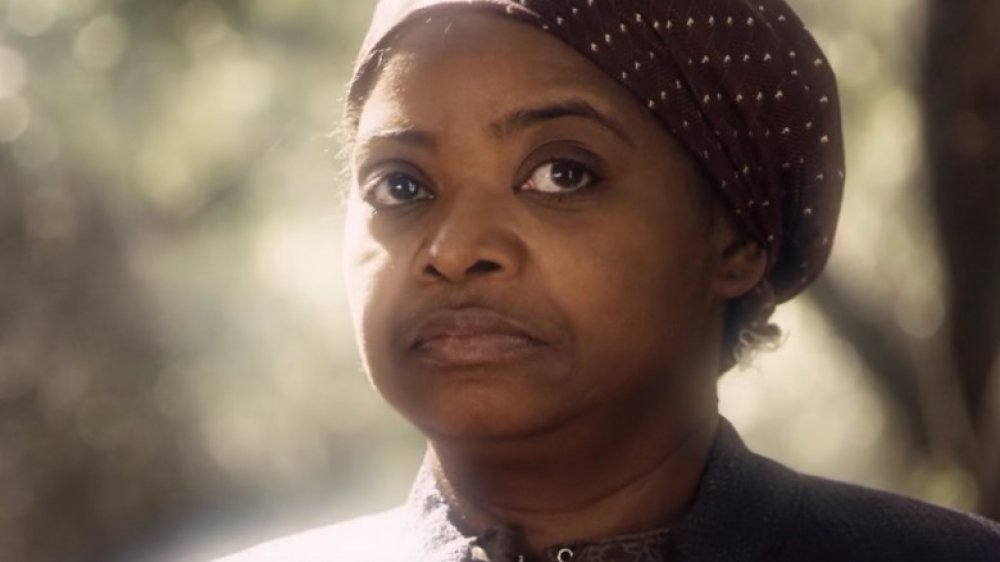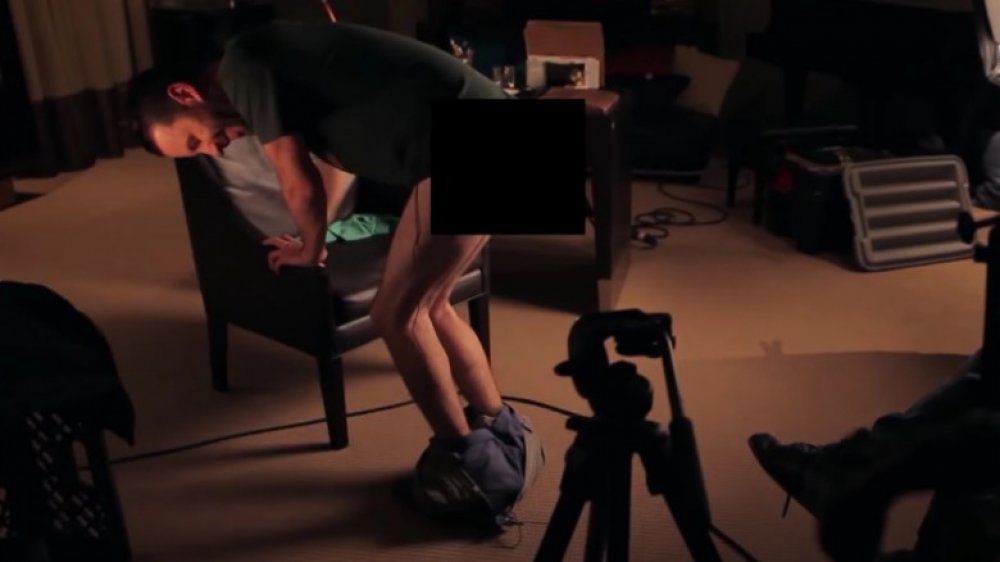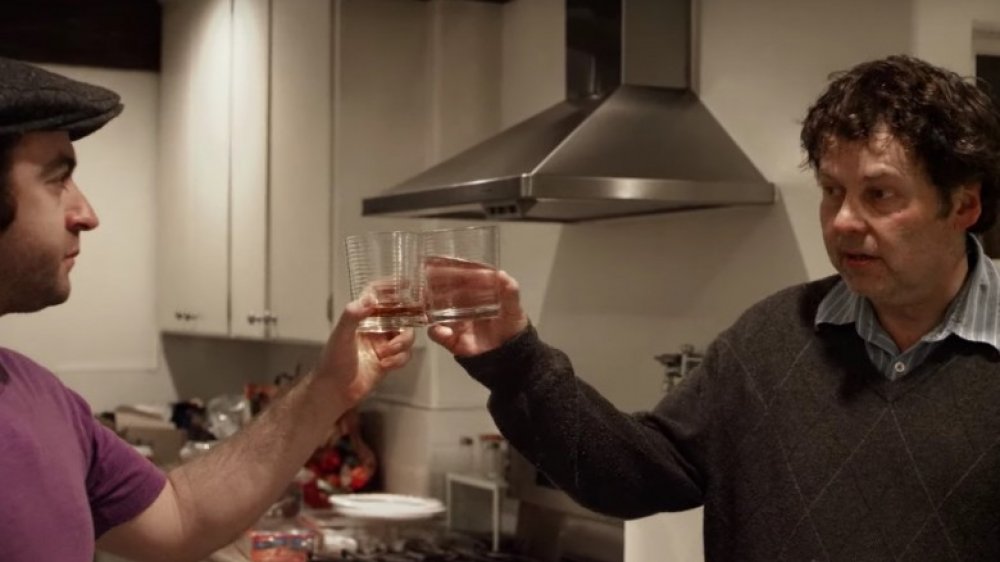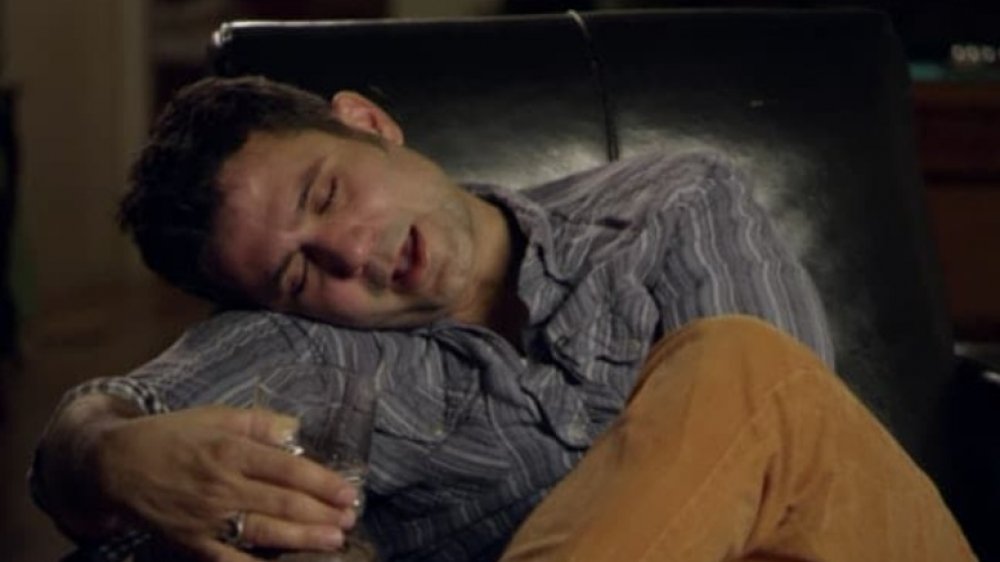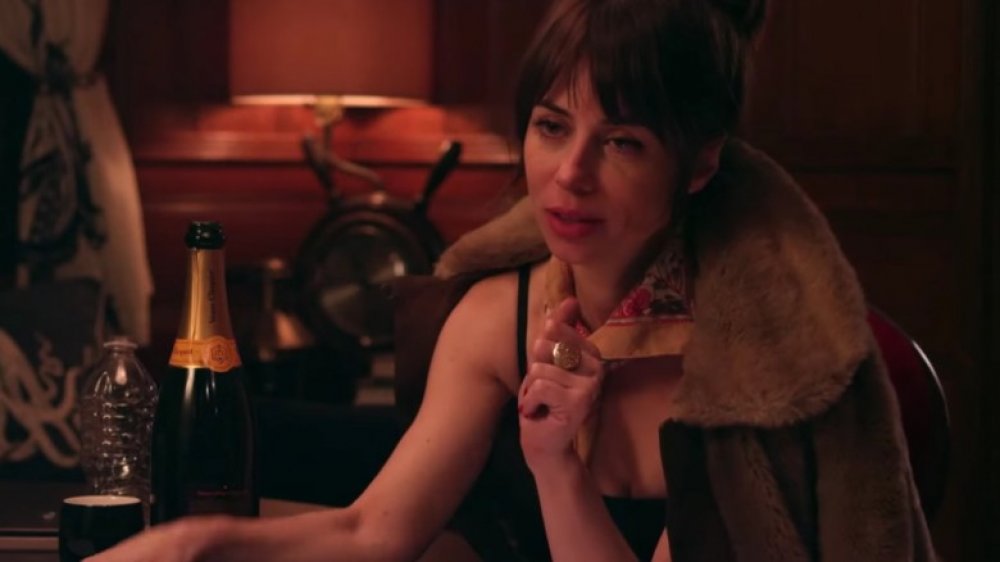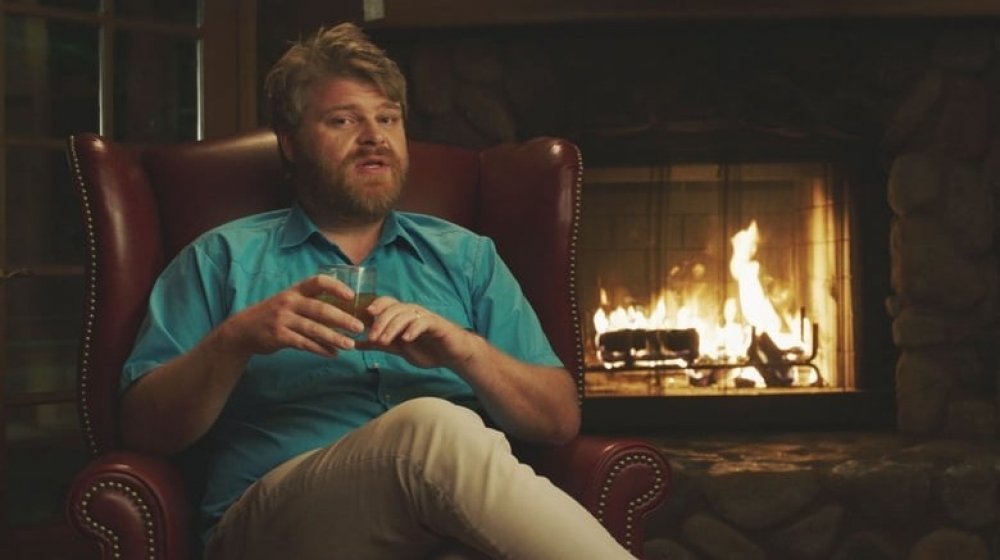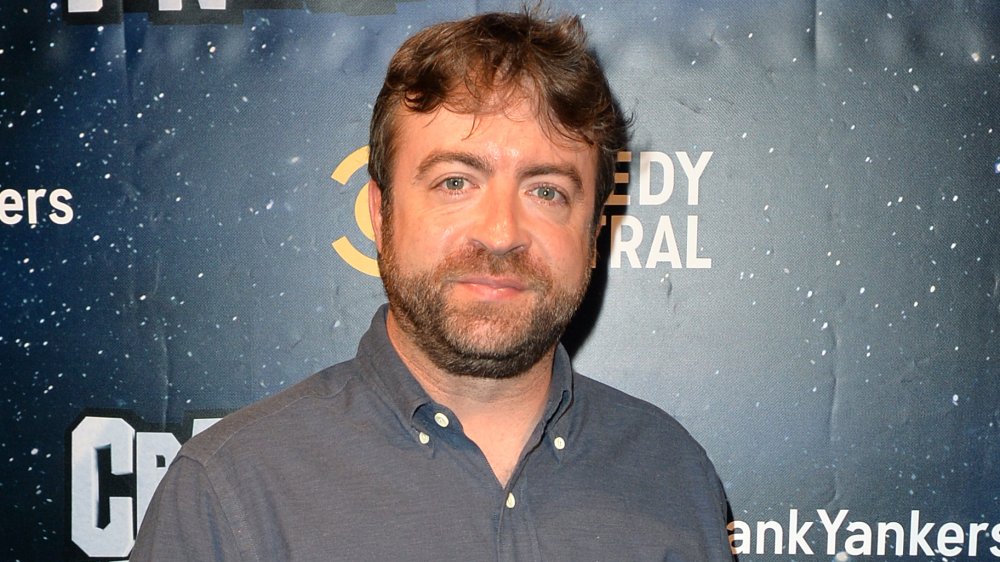The Untold Truth Of Drunk History
In 2013, Drunk History acted as an intrepid pioneer, becoming one of the first internet-based video series to move to cable television. In other words, the show about history made daring history of its own. It's only fitting, because Drunk History was a completely original television series, bringing big ratings and critical acclaim to Comedy Central with its unique premise.
Co-creator Derek Waters carefully got comedians and actors extremely drunk and then helped them along as they narrated important but often little-known stories from American history. Then, a troupe of actors (and A-list movie and TV star guests) would act out and lip-sync to those inebriated retellings, in full period costume. The result: six seasons' worth of a hilarious, falling-down funny show (about falling-down drunk people) that was also educational and even inspiring. And in the spirit of this glorious show about spirits, let's teach you some stuff you likely didn't know from the history of Drunk History.
How Drunk History started
Drunk History was co-created by Jeremy Konner and Derek Waters, who was also the de facto host of the show, frequently seen drinking a tequila shot with a narrator or donning a tri-corner hat for a reenactment. According to The New York Times, the whole thing stemmed from a conversation Waters had in 2007 with actor Jake Johnson. Waters and Johnson were — duh — drunk, and Johnson was passionately, furiously, and sadly trying to explain to Waters how Otis Redding died.
How hilarious and awesome it would be, thought Waters, to tape drunk people telling a rambling drunk-person story about a historical event and then get actors to reenact the drunk-person story. Waters had the idea for months but didn't do anything about it because he didn't think it would work. Plus, he didn't have any clout. Fortunately, one of his best friends was Juno and Arrested Development star Michael Cera, who kept encouraging him to do it and promised to be in the show if he ever made it. Clout granted.
In August 2007, the first Drunk History premiered on Funny or Die, narrated by Mark Gagliardi and starring Michael Cera in the story of Alexander Hamilton and Aaron Burr's 1804 duel to the death (which was a good decade before Lin-Manuel Miranda did it with beats, and without booze, in Hamilton).
There were three iterations of Drunk History
Few shows premiere with a perfectly formed premise and sensibility right out of the gate. It takes most a while to get going — even The Simpsons wasn't any good until Season 3 or so. Drunk History, however, was just as good and consistent after nearly 100 episodes in 2019 as it was after its first Comedy Central broadcast in 2013. That's probably because the show's creative staff had a couple of less high-profile "trial" runs where they could work out the kinks before hitting the potentially massive audiences of basic cable.
Drunk History began life as a web-only anthology series on Funny or Die in 2007, becoming one of the comedy site's first and biggest hits. Then, along with some of its fellow FOD standouts, Drunk History was ported to HBO in the form of the late-night anthology Funny or Die Presents, a short-lived attempt to bring internet videos to people who could afford HBO but didn't know how to use the internet.
The initial idea for Drunk History was a lot different
Drunk History had a concept so simple and so delightful that it seems like it must have emerged fully formed from the possibly booze-addled minds of its creators. But in its first incarnation, it was a completely different animal. Waters' first pitch for the show wasn't the talk-sketch-school play hybrid it became — it was a reality show. According to IndieWire, the concept was that Waters, an American guy in his thirties, had somehow made it to adulthood knowing nothing about American history. So, he'd rent a bus and would drive across the country, popping into bars and parties in major cities, where drunk locals would tell him ribald and unfiltered tales of local history.
While the show's concept changed into something a bit more manageable, and a whole lot funnier (professional comedians are usually better at the jokes than some guy at the bar), this original concept was retained in the early seasons of the show as a framing device. Episodes were themed around the history of a certain city, and Waters taped segments in bars, where local boozehounds rambled on and on about how their city is great.
Drunk History is incredibly accurate
While a brain on booze isn't the most reliable, or consistent, conduit of information, the cast and staff of Drunk History ensured that the show's narration segments (and by extension, the reenactments) came out scarily accurate, albeit in a tipsy way.
Producer Seth Weitberg oversaw a group of history doctoral students from UCLA, who compiled 500 or so potential Drunk History stories before each season began taping. That list was then pared down to 39 (three stories for each of 13 episodes), and each one was matched up to the comedians who signed up to narrate, based on their historical interests as determined by co-creator Derek Waters during a sober pre-interview. "Most of the people who do it have some sort of idea of the story prior — or the world that it's gonna be discussing," Waters told The Wrap in 2018.
To virtually guarantee that the guest stars appear to be experts on their topic — even after six glasses of scotch — they're encouraged to cram like it was a high-school history test. "We send them a research packet so that they have one to two weeks of studying it over and over again," Waters said. The packets usually consisted of a three-page summary of the historical figure or event, links to pertinent documentaries, and book recommendations for a deeper dive. When taping actually happens, Waters just lets the narrators ramble on – stopping them only if they get a date, name, or some other fact wrong. And if they pass out, presumably.
People really learn from Drunk History
Drunk History was both extremely accurate and deeply entertaining, which would probably make it an effective educational aid in history classes — were it not for all the unbridled drinking and bleeped profanity. Still, its value came from an earnest and honest place. "I wanted to be a teacher," co-creator Derek Waters told Entertainment Weekly. "I just never thought I'd be a teacher like this."
Some fully licensed and trusted teachers have definitely thought it was a good idea to show Drunk History to their classes, even if it wasn't a good idea. In a 2014 interview, a Movieweb reporter told Waters that his cousin, an 11th- and 12th-grade teacher, "thought it might be fun to show" a few Drunk History clips to her students ... and then she got into a bit of trouble with her local school board. "You have to wait until after high school or you'll get in trouble," Waters explained, adding that his show seems to be a valuable teaching tool at the college level. "People have told me that their professors show a clip. The thing that gets me is some people say, 'I had a test, and I didn't know this until I saw Drunk History. I passed. I knew this question that was on my test because of Drunk History.'"
Derek Waters worked hard to nail down the premise
According to IndieWire, before it became a series, Waters says he was offered the chance to do Drunk History as a bunch of sketches that would be edited together into a feature film. It would've been a sketch movie, joining the ranks of Kentucky Fried Movie, Amazon Women on the Moon ... and literally no other films of note.
While a company throwing money at you to make your movie seems pretty awesome by any metric, Waters actually turned it down, because he knew the concept of a drunk person describing a historical event acted out by people in period garb is something that would only work in small doses. Further down the line in the production process, the History Channel showed interest in putting Drunk History on the air ... but wondered if the word "Drunk" had to be in the title, or if the narrators had to be drunk. So, it'd just be History? That ... kind of kills everything special about the show.
Not just anyone could handle Drunk History
He helped create and starred for a decade on a hot property that looked like a lot of fun (not just for the drinking, but for the history!), so Derek Waters was naturally beset by requests from agents of big-time Hollywood big shots who wanted to be on Drunk History. And he was happy to have them on, provided they wouldn't act like pretentious prima donnas about the whole thing.
Fortunately, there are certain fail-safes that weeded out a lot of potential human buzzkills. The fact that the reenactments took all day or more was a major turn-off for busy actors, as was the fact that the show operated on such a shoestring production budget that it could only afford to pay $600 for a day of on-screen work. (You can't be a prima donna for that little money — it's impossible.) Nevertheless, some far more humble stars were still down, like Oscar-winner Octavia Spencer, who guest-starred as Harriet Tubman. Waters exclaimed that she was a delight to work with.
And on occasion, Drunk History producers would approach stars with offers and roles in mind. One major actor who declined the chance to star in a historical reenactment: Adam Sandler, who didn't want to play Davy Crockett in a segment about the Battle of the Alamo. Waters took on the role himself. "I really wanted to be Davy Crockett, and I'm glad Adam Sandler said no," Waters told Entertainment Weekly.
Drunk people make for technical difficulties
Drunk History was something of a technical marvel — and likely very tricky to capture on film. For the actors to get their lip-syncing of the drunk narrators' tales just so, the sets of the historical reenactment segments were outfitted with gigantic speakers that bellowed out the drunk narrations, a few lines at a time, on loop. But the real technical problems come when shooting the drunk portions. Oddly enough, drunk people combined with expensive filmmaking equipment added up to potential disaster.
Co-creator Jeremy Konner told Complex that problems with audio were almost a given and that the drunker the comedians got, the less they seemed to care about keeping the expensive microphones safe. (Or they were just unable to because they were, you know, drunk as skunks.) "They scratch them. Some people grab the boom mic from above," Konner said. Another problem: The narrators sometimes got so hammered that they wound up laying facedown on the ground or on a couch, and they would try to tell their stories that way. Unfortunately, microphones can't pick up audio when it's drunkenly mumbled into a couch cushion or throw rug.
Just how drunk were the narrators?
Derek Waters liked his narrators good and hammered for real — the show was called Drunk History, not Sort of Tipsy History, after all. This explains why, according to him, every single one of the narrators puked at some point during their taping (but there was a house rule on the show that they'd only depict it on-screen once per segment).
Waters even worked up a little drinking routine, to deliver maximum drunk narrator potential. Waters encouraged the comedians to have one drink (okay, two) before the crew arrived, to get them warmed up and loose. But not too many — Waters has said he's had to reschedule when he's shown up at a narrator's house and they were already five or six sheets to the wind. Then, to loosen them up further, and to get them comfortable with losing all their inhibitions on national TV, Waters would share a drink with the narrator. The drinking continued throughout the shoot, so narrators got pretty plowed.
What specific alcohols worked best? Over the span of the show, Waters told Cheddar News, he learned that beer makes people talk too much about themselves, wine makes them sleepy, and bourbon "makes you do what I like on the show, which is make you think you're the smartest person."
Drunk History employed several fail-safes
A taping of the average narration segment could last around six hours, according to Business Insider. The process took so long because, like any other filmed entity, multiple takes were required, from which the best was selected later on. Hint: On Drunk History, it was usually the one where the narrator is the drunkest ... but not necessarily one where the comedian is trying to be funny. Waters said it's because people naturally try to be funny when they're drunk — and many just plain aren't. Even professionals forget how to craft a joke when the world's spinning all around them.
To ensure that nobody died of alcohol poisoning in pursuit of a funny shot for a basic cable TV show, the Drunk History production crew included a medic to prevent anyone from choking on their own vomit. Oxygen was also frequently administered, since it's apparently really good for drunks to get that little hit of oxygen. It doesn't make them less drunk, or anything — it just wakes them up a little, so they can keep making good, boofy-blitzed TV.
Okay, but who got the drunkest?
Drunk History filmed actual drunk people being drunk, but some got far more drunk than the rest. Co-creator Jeremy Konner told Complex in 2015 that two narrators stood out: Comedian Duncan Trussell somehow managed to tell the story of Thomas Edison's destruction of rival Nikola Tesla from the floor of his bathroom, surrounded by his own pizza vomit.
The other was Another Period star Natasha Leggero (pictured above), who drank a bottle of white wine and followed it with some tequila shots. Because she was wearing a swimsuit for some reason, Leggero then decided she wanted to film from her bathtub, but she filled it up with moisturizer instead of soap. She was thus unable to narrate the story of the Patty Hearst kidnapping, and Waters and Konner put her to bed, still in her swimsuit, still soaking wet. She called the duo the next day, unable to remember if they'd finished taping or not. They hadn't, so they had to reschedule.
In 2018, Waters added a third member to the unofficial Drunk History hall of fame: Kyle Mooney. He told Cheddar News that the Saturday Night Live star got extremely drunk during one of his narrator appearances, albeit "comedically drunk."
Last call for Drunk History
Drunk History aired its sixth-season finale on Comedy Central in August 2019, and a few weeks later, the network ordered a seventh season as part of a major production and development deal for co-creator and star Derek Waters, according to Deadline. But networks can and do change course. About a year later, in August 2020, per Variety, the cable outlet decided it didn't want more Drunk History after all and cancelled the renewal, effectively ending the show. (Waters' big contract with Comedy Central remains intact, and he'll work on other shows for the channel ... just not Drunk History.)
The show remained a decent performer, and at the time of its cancellation, it had just been nominated for multiple Emmy Awards, including Outstanding Variety Sketch Series. What truly killed the show was that it was a victim of an evolving approach to programming. After coronavirus-related shutdowns led to temporary production delays on live-action shows, Comedy Central cancelled or moved nearly all of its scripted shows starring flesh-and-blood humans, sending The Other Two and South Side to HBO Max and killing Drunk History. The network plans to focus instead on animated shows geared toward adult audiences.
The lost episode of Drunk History
When Comedy Central suddenly canceled Drunk History in the summer of 2020, production on the show's seventh season had been halted for months due to international shutdowns over coronavirus concerns. Anything and everything the show had in the works now won't come to pass (or at least not anytime soon, and not on Comedy Central). Unfortunately, that put an end to co-creator and host Derek Waters' plans to pay tribute to the person from his Baltimore childhood who made him a history buff, and whose teaching style had a strong influence on Drunk History.
"Why I love history, is my high school teacher, Mr. Stange," Waters told Gold Derby a few weeks before his show's cancellation. "He would be able to somehow relate the historical figure that we're learning about or the moment in history and then turn it into why the Orioles suck right now." Waters had an episode in the works where drunk narrators discuss their favorite and most personally impactful teachers, and it would have ended with Waters and Mr. Stange "getting drunk and teaching the story of the Whiskey Rebellion with Alexander Hamilton."
